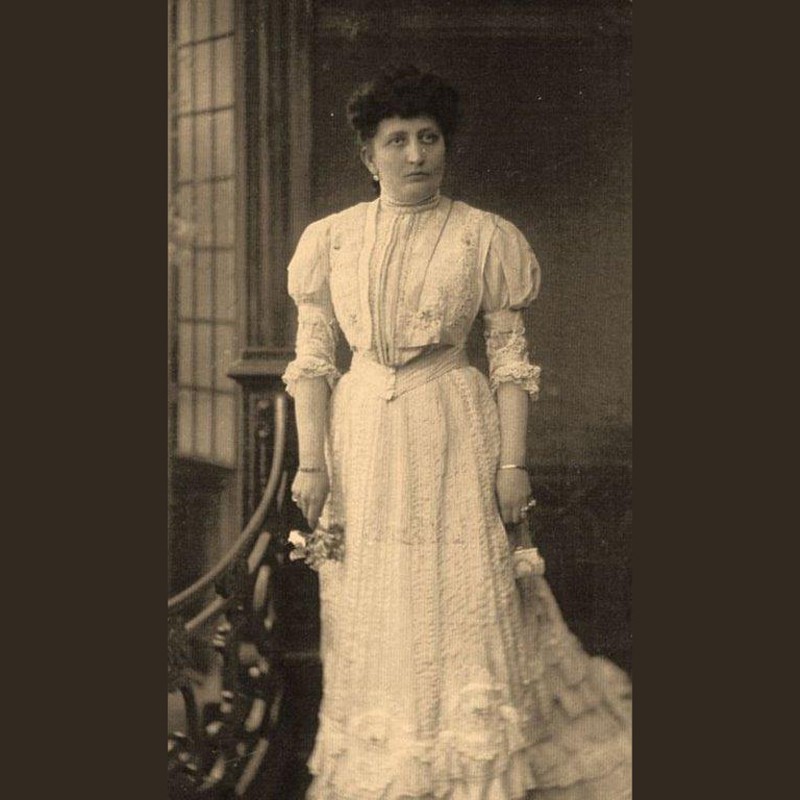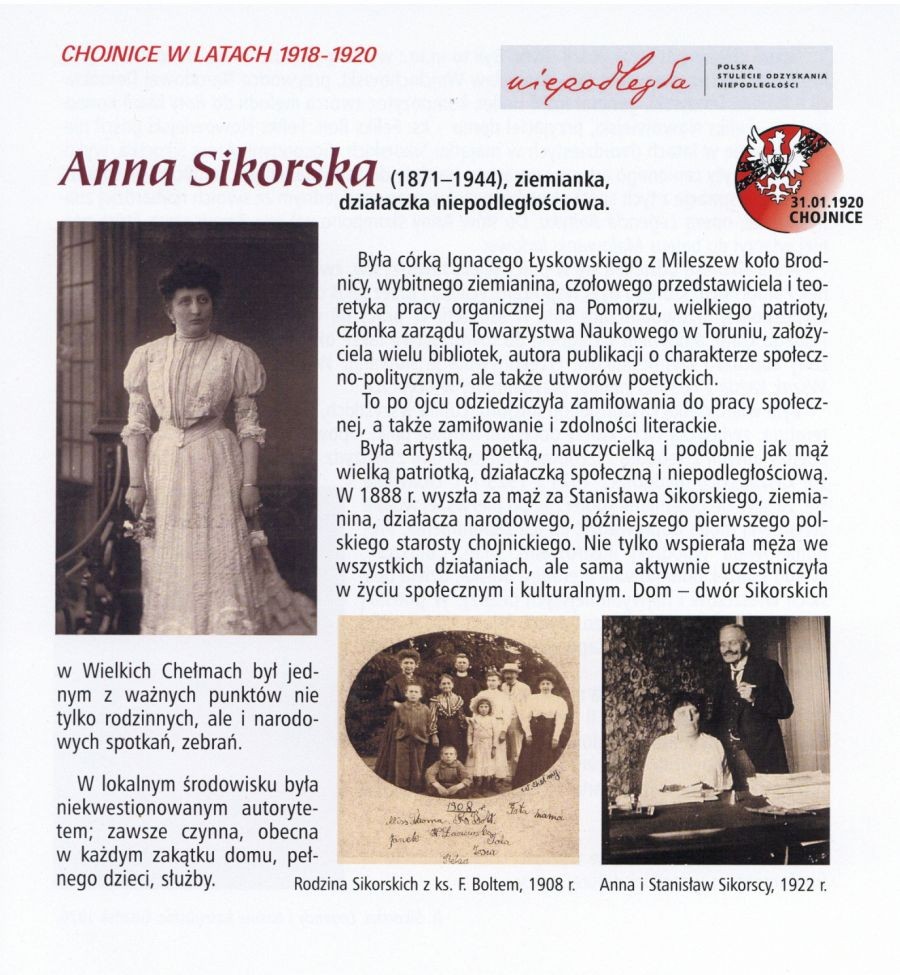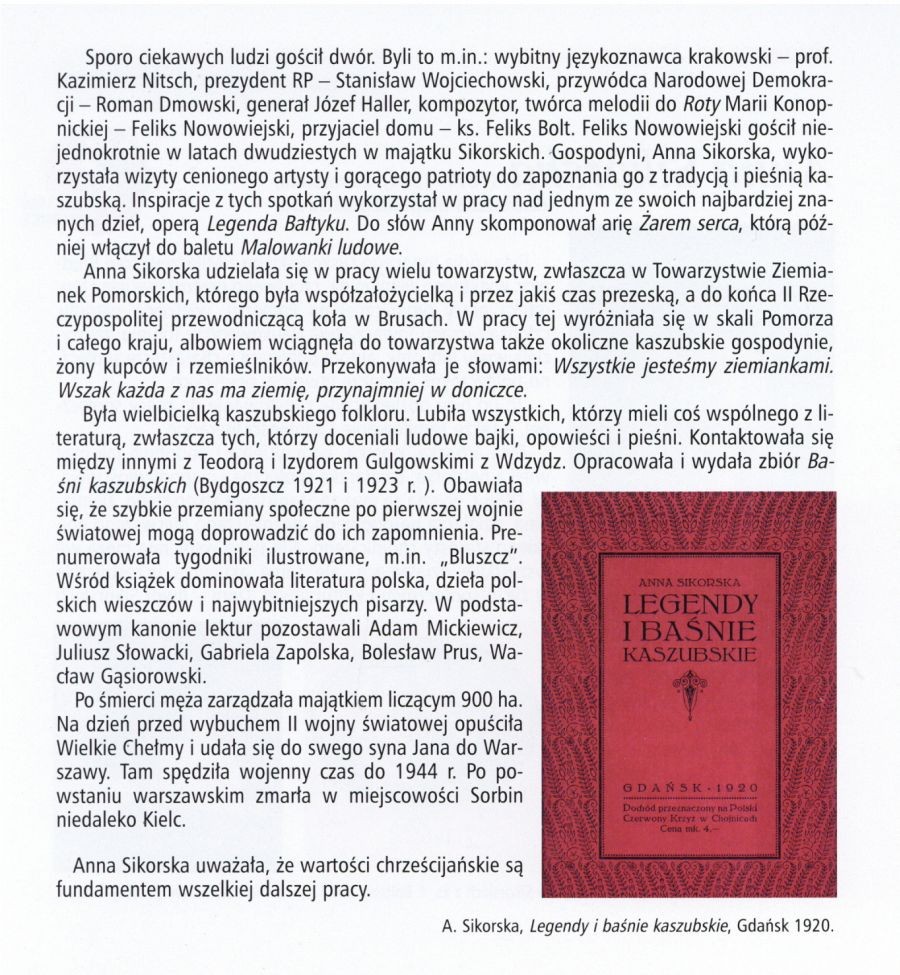
Anna Sikorska (1871-1944), landowner, independence activist
This energetic person in a long dress, captured in an old photograph - the daughter of Ignacy Łyskowski from Mileszew (1820 - 1866), was a poet, a teacher and, like her husband Stanisław Sikorski (1855 - 1929), the first starosta of Chojnice - a great patriot. Today, Anna Sikorska could pass on to the contemporary generation the universal and imperishable values which guided her throughout her life.
The Sikorskis' manor house in Wielkie Chełmy was one of the important meeting places not only for families, but also for those of national importance. It hosted, among others, the President of the Republic of Poland Stanisław Wojciechowski, the leader of National Democracy Roman Dmowski, General Józef Haller, and the composer Feliks Nowowiejski. Anna used the latter's visits to familiarise him with Kashubian tradition and song, which in time resulted in the composition of the well-known opera Legenda Bałtyku, or the aria entitled Żarem serca, later included in the ballet Malowanki ludowe. Anna Sikorska, being an admirer of Kashubian folklore, was also a friend of Teodora and Izydor Gulgowski from Wdzydze. Her great achievement was the publication of a collection of Kashubian legends and fairy tales in Gdańsk as early as 1920, whose reprint was published by the Museum in Chojnice in 2006. She was convinced that the traditions of her own region should be nurtured so that they are not forgotten. She was convinced that the traditions of her region should be nurtured so that they are not forgotten, and wrote, among other things, the lyrics to a song about her hometown of Wielkie Chełmy near Chojnice:
And whoever wants to forget his worries must get to know the Chelm forest.
For our Kashubian forests are full of magnificent beauty.
Forest nymphs reign here, enchanting many.
(...) Keep watch over your heart, dear boy, in the land of pines and heather.
Oh, beware, blond boy, of the area where the Brda flows.
(...)And whoever the rustle of the forest mentions, will never forget Kashubia!
As president of the Pomeranian Women's Society, she distinguished herself in Pomerania and the whole country - she also attracted local Kashubian housewives, wives of merchants and craftsmen to the society, hinting at the importance of shaping one's own character and selfless work for the good of others. In her article entitled. ‘From the Society of Landowners and the Society of Polish Women’, published on 12 October in “Dziennik Pomorski” in 1932, she included universal information on the understanding of culture, including good manners, behaviour at table, the concept of beauty and good taste - extremely relevant to this day:
‘At the last meeting of the Society of Women Landowners and the Society of Polish Women on 7 October 1932 in Chojnice, a lecture was given by the chambermaid, Anna Sikorska.
One of the words that are indifferent, and yet understood differently by different people, is the word ‘culture’ and the term ‘cultured man’. Some equate culture with civilisation, others with education, and there are also those who believe that it is a quality that man, as an innate characteristic, brings with him into the world. The etymology of the word itself, which has its equivalent in the Polish ‘hodowla’ (breeding) or ‘uprava’ (cultivation), indicates that it is something that, given the right skills and care, can be grown and nurtured on a given soil, but does not come into being on its own and without care will not be able to flourish. So when we say of the soil that it is in culture, we mean by this that it has been carefully cultivated and adequately nourished to receive the meal the farmer dedicates to it.
The same deliberate nurturing of certain germs inherent in human nature, the imposition of certain habits and the eradication of others according to a preconceived and predetermined plumb line, is what we aim at when we are concerned with the education of the cultured man and here the ground for our breeding will not always be fertile either, the embryos that we nurture may turn out to be weaker or stronger, so the result achieved may also vary in some cases, depending depending on the material we have at our disposal as well as on the skilful handling by the breeder, i.e. factors without which no culture can do without no culture can do without.
The breeding of a cultured human being begins in childhood. They become accustomed to order and cleanliness, to behaving aesthetically when eating or playing. to behave aesthetically when eating or playing, to instil a sense of the beauty of pretty drawing and colouring toys are the first stage on this path. As the child grows development of the child, this will become more and more apparent. Gradually not not only the beauty of the objects around them, not only the wonders of nature, but the the beauty of noble thoughts and deeds becomes available to him, awakens in him adoration and a desire to imitate.
Following the path once laid out in this direction, man becomes more and more enamoured, desires to know beauty more and more and to absorb more and more of it. He wants to get to know the beautiful landscapes described in books. He becomes acquainted with works of art and wants to hear the artistically rendered works of great playwrights and composers of musical works. His ideal is to draw from the treasury of beauty all that is available in it, because he has come to love this beauty, because it has become a necessary need and condition of happiness and the natural background of his life. A man who has possessed such an inner culture, who has awakened such a reverence for beauty in his soul, abhors everything that is dirty, low and common, that is a negation of that beauty.
A man brought up in such a cultured way, beginning with what is closest to him, with what he is in direct contact with, that is, with caring for the cleanliness and external appearance of his own person, with the aesthetic arrangement of his home, the setting of the table and the serving of food, extends this to his inner being and all the manifestations of life.
His sense of beauty also protects him from using coarse expressions, from engaging in gossip that is derogatory to the honour of third parties, from committing anything dishonest that is not in harmony with chivalry and honour.
It is impossible to forget the immense contribution of the Sikorski family to the cultural life of Polish, and especially Pomeranian, landed gentry. Anna's role in shaping patriotic attitudes, as well as her understanding of the ‘small fatherland’ and the influence of women in society, shows the young generation imperishable values. When visiting the manor house in Wielkie Chełmy, where the primary school is located today, it is impossible to miss the story of Anna and Stanisław Sikorski, who were so committed to the education of society and especially to the good upbringing of children and young people.
Beauty is the inner, categorical imperative of the truly cultured man, both in trifles and in things of great importance. Tact, moderation, harmony in everything he does, which characterises his actions, protects him from exaggeration in every direction despite his individually strong convictions to look life straight in the face with the courage to always be himself.
The sense of beauty, once awakened, can be educated, honed and developed further and further by becoming familiar with new fields of beauty, by training the taste on works of talent and by comparing them with one another.
The last war wreaked great havoc on the cultural heritage of the nations involved. Those of us who still have in living memory the times preceding this hurricane of history see with sadness the decline of culture at every turn. Crude vulgarity and hatred triumph in crude expressions and phrases. Any dispute arising out of the most trivial of motives is met with the vile rantings of the feuding parties. The disease is rife.
Fortunately, however, there is a hitherto indelible difference between the types of people, between evil and good, between beauty and ugliness, and the healthy instinct of society always senses these differences.
Women have long been the pioneers in this field. They brought into life with the necessary beauty, they decorated their homes with their own sweetness and gentleness, and with their. They softened the customs of their surroundings with their own patience, they combated brutality. In civilised societies, the woman as the nurturer of the of a new generation, she instils noble elements into their souls. She brings elements of beauty and nobility in all areas of life, a woman will gradually right the wrongs of war and put culture on the right track in her the right track of culture in its march...’
A great blow to Anna Sikorska was the death of her beloved husband Stanisław on 29 June 1929. She left Wielkie Chełmy and went to join her son Jan in Warsaw. After Warsaw Uprising in 1944, she died in Sorbin near Kielce.

